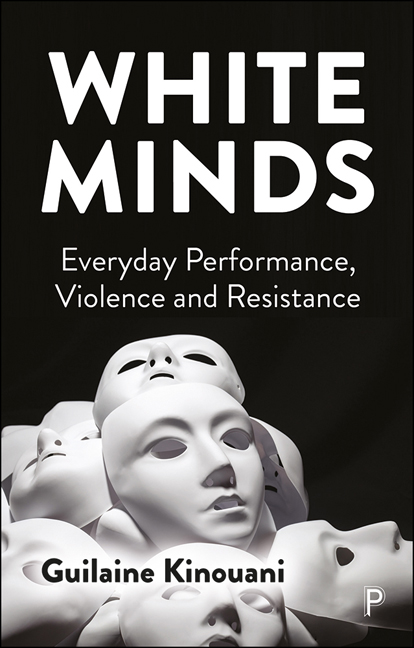Book contents
- Frontmatter
- Dedication
- Contents
- Acknowledgements
- Preface
- Note on language
- Introduction
- 1 Whiteness, time and space
- 2 White gazes
- 3 White envy
- 4 White sadism
- 5 White trauma
- 6 White dissociation
- 7 White shame
- 8 White ambivalence
- 9 White complicity
- Whiteness and resistance: by way of conclusion
- References
- Index
- Frontmatter
- Dedication
- Contents
- Acknowledgements
- Preface
- Note on language
- Introduction
- 1 Whiteness, time and space
- 2 White gazes
- 3 White envy
- 4 White sadism
- 5 White trauma
- 6 White dissociation
- 7 White shame
- 8 White ambivalence
- 9 White complicity
- Whiteness and resistance: by way of conclusion
- References
- Index
Summary
What are you without racism? Are you any good? Are you still strong? Are you still smart? Do you still like yourself? If you can only be tall when someone is on their knees, you have a serious problem and I think white people have a profoundly serious problem and I suggest they start thinking about what they are going to do about it.
(Morrison, 1993 [1])A cultural note
The year 2018 saw the release of the long-awaited superhero film based on the Marvel comic of the same name, Black Panther. Black Panther is the first film in the Marvel cinematic collection centred on a superhero of colour: black prince King T’Challa. The movie, which is set in the imaginary African location of Wakanda, also sees a virtually all-black cast defeat its enemy, avoid colonial invasion and successfully head a global technological revolution. Although the film can and has been astutely critiqued for its use of Western colonial motifs and significant capitalistic imaginary, its cultural significance is indisputable. Commensurate with this significance and the storyline which portrayed black subjects beautifully, and as agents of their own destiny, was the black joy that instantly erupted upon the release of the movie. By black joy here I simply mean a shared and collective sense of joy among groups racialised as black originating from the same event.
Black Panther brought a significant sense of euphoric pride in black groups across the diaspora, and although I focus here on the UK, videos of celebrations and joyful communication and dances shared on social media from across the world suggest that joy may have been global. With that joy came a significant backlash. I have observed it mainly online through the racist comments and abusive trolling of those seen to be happily tweeting about the movie or singing its praises. Anonymous social media accounts and identifiable figures came forth en masse as a reaction. Many, it appeared, worked hard to spoil the moment, deriding it, mocking the joy and even racially abusing those expressing it. It is clear that the hate-filled responses were not only acts of opposition to the quality of the movie, or forms of critiques, as it may be tempting to propose.
- Type
- Chapter
- Information
- White MindsEveryday Performance, Violence and Resistance, pp. 52 - 67Publisher: Bristol University PressPrint publication year: 2023

